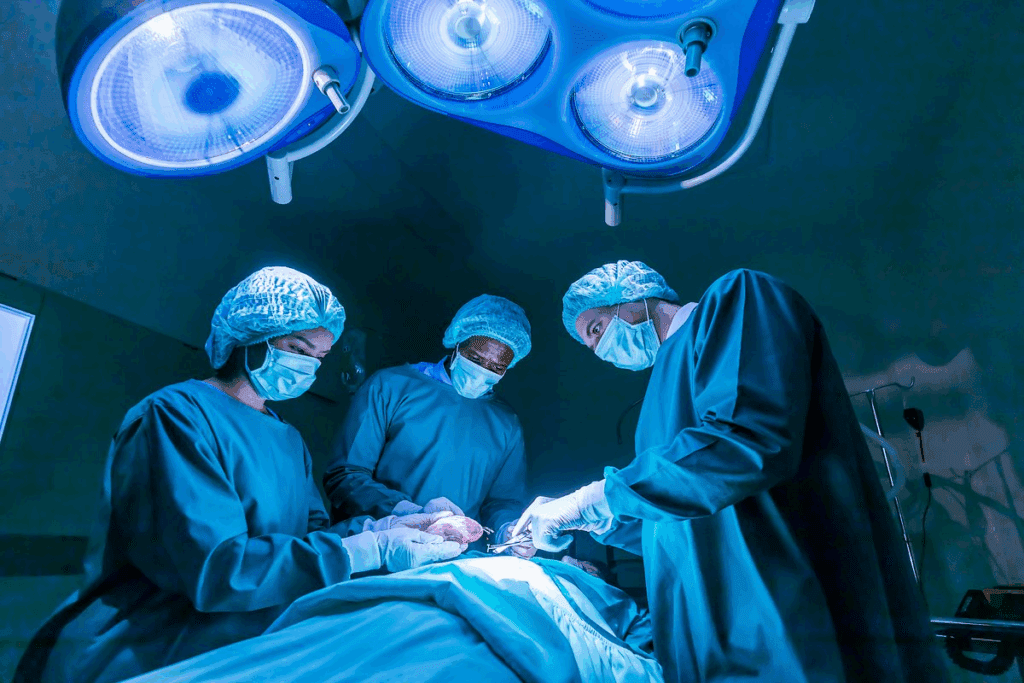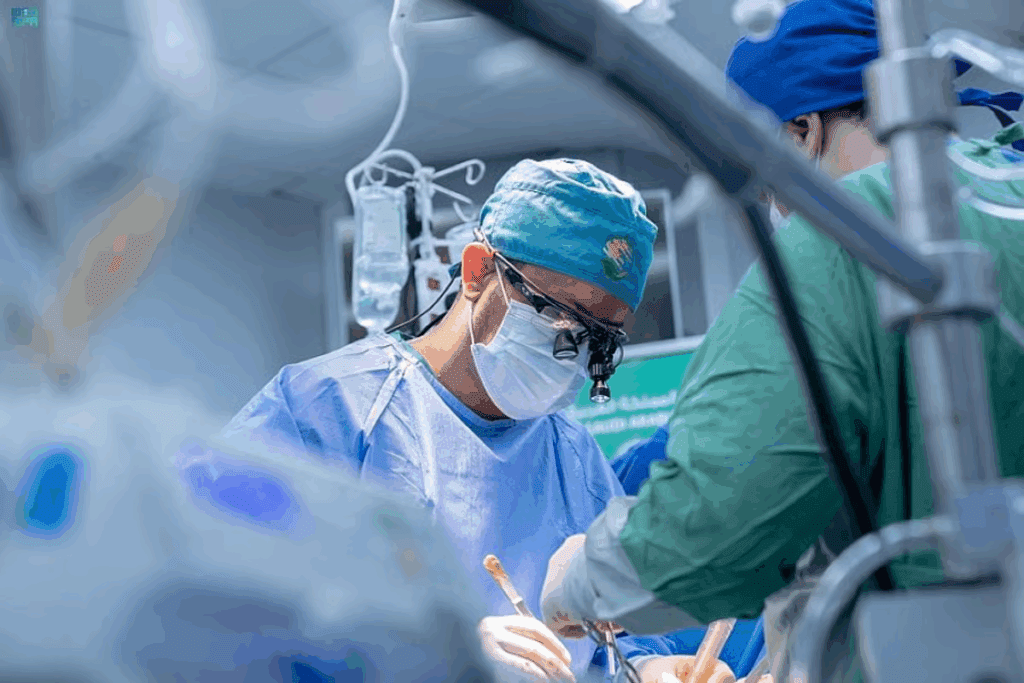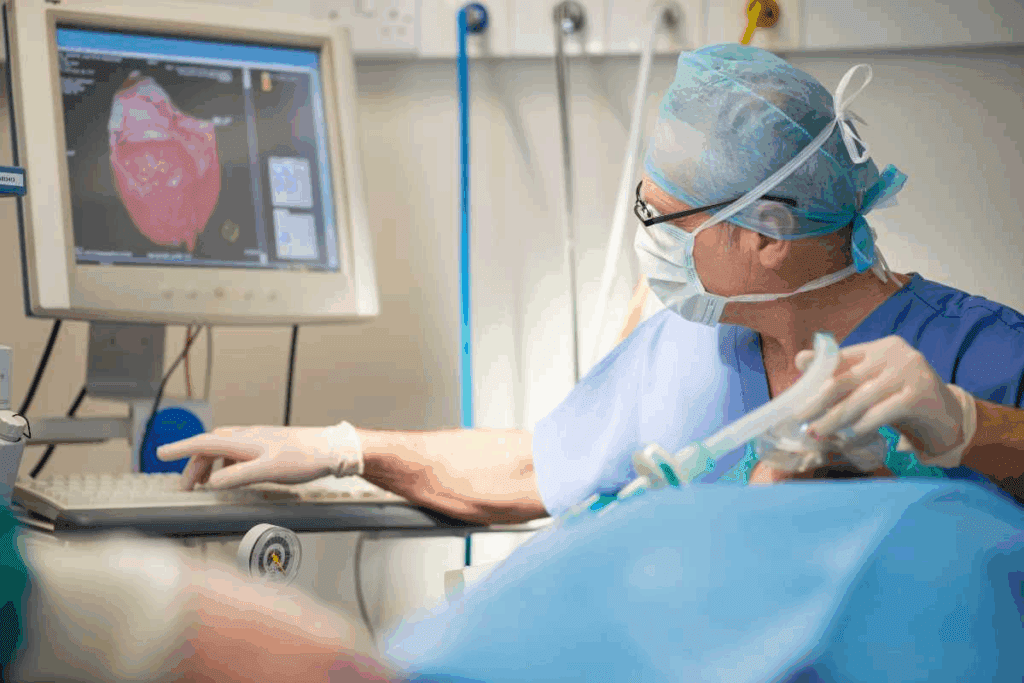Last Updated on November 27, 2025 by Bilal Hasdemir

Every year, more than 300,000 people worldwide get coronary artery bypass grafting (CABG), also known as bypass surgery. Over 70% of these patients are over 70 years old. This shows that age doesn’t stop people from getting this life-saving surgery.
Open heart surgery, or CABG, is a big surgery that can really improve life for those with severe heart disease. When deciding on CABG for someone over 70, doctors look at their overall health and the risks.
Most people see big improvements or even no symptoms after CABG. They stay symptom-free for many years. Knowing about the open heart surgery survival rate helps patients and their families make good choices.

Cardiac surgery for 70-year-olds has both benefits and risks. It’s becoming more common as people live longer and surgery gets better.
Seniors often face complex heart issues that need surgery. These include coronary artery disease, valve problems, and heart failure. Coronary artery bypass grafting (CABG), or bypass surgery, is a common procedure for them.
Age plays a big role in deciding if surgery is right. Older patients often have more health issues and can’t bounce back as easily. Surgeons weigh the risks and benefits for each patient. The survival rates for triple bypass surgery and quadruple bypass surgery depend on age, with older patients facing higher risks.
| Age Group | Triple Bypass Surgery Survival Rate | Quadruple Bypass Surgery Survival Rate |
| 70-74 Years | 95% | 92% |
| 75-79 Years | 90% | 88% |
| 80+ Years | 85% | 80% |
Knowing these stats helps make better choices about heart surgery. It’s also key to think about each patient’s health and how well they might recover.

Knowing the survival rates for open heart surgery is key for patients and doctors. Over time, these rates have gone up. This is thanks to better surgery methods, anesthesia, and care after surgery.
Research shows that older patients doing elective heart surgery have low death rates. But, urgent surgeries are riskier. The good news is that many elderly patients survive open heart surgery and the first few days after.
“The rise in survival rates comes from better patient choices, surgery methods, and care after,” says a top heart surgeon. This highlights the need for a thorough check before surgery.
Patients aged 70-75 have very good survival stats. Studies show they do better than older groups. This makes open heart surgery a good choice for many in this age range.
Survival rates for open heart surgery have gotten better over the years. New medical tech, surgery methods, and understanding care after surgery have helped.
Key factors contributing to improved survival rates include:
As medical science keeps getting better, so will survival rates for open heart surgery. This brings hope to patients and their families.
As people get older, their bodies change in ways that can affect heart surgery results. These changes can make it harder for older adults to recover from surgery. They might face more complications during and after the operation.
The heart changes with age, like losing strength and becoming stiffer. These changes make it harder for the heart to bounce back after surgery. Older adults also often have other health issues that can make surgery riskier.
Conditions like diabetes and high blood pressure are more common in older people. They can make surgery more risky. These conditions can slow down recovery and affect how long someone might live after surgery, including bypass surgery survival rate by age and quadruple bypass surgery survival rate.
Frailty is a big factor in how well someone does after heart surgery. Tests like the CAF and FORECAST can predict how likely someone is to die soon after surgery. These tests help doctors know who is at higher risk and how to best care for them.
It’s key to understand how age affects heart surgery risks. By looking at how the body changes with age, existing health issues, and frailty, doctors can make better choices. This helps ensure the best treatment for older patients, affecting their average lifespan after bypass surgery.
Elderly people may need heart surgeries to improve their heart health and life quality. As more people age, these surgeries are becoming more common. It’s important to know about the different types available.
Coronary Artery Bypass Grafting, or CABG, is a common surgery for seniors. It involves attaching a healthy blood vessel to a blocked artery. This improves blood flow to the heart. The American Heart Association says CABG helps those with serious heart disease.
Seniors often have valve replacement or repair surgeries. These surgeries fix heart valve problems that can happen with age. Valve replacement means putting in a new valve, while repair fixes the old one. The choice depends on the valve’s condition and the patient’s health.
Seniors may also have other heart surgeries. These include surgeries for irregular heartbeats, hypertrophic cardiomyopathy, and heart transplants. Decisions on these surgeries are made after a thorough evaluation by a cardiac surgeon and a team. A study in a Journal says choosing the right surgery is key for elderly patients.
“Advances in cardiac surgery have significantly improved the outcomes for elderly patients, giving them a better quality of life and longer life expectancy.”
A renowned cardiothoracic surgeon
Knowing survival rates by age is key to making informed decisions about bypass surgery. Bypass surgery, or coronary artery bypass grafting (CABG), is a common treatment for severe heart disease.
The number of grafts used, like triple or quadruple bypass, affects survival rates. It’s important for both patients and surgeons to understand these differences.
Triple bypass surgery grafts three coronary arteries. Studies show high survival rates for those under 70. The triple bypass surgery survival rate depends on the patient’s health and other medical conditions.
Quadruple bypass surgery grafts four coronary arteries for more severe disease. The quadruple bypass surgery survival rate and survival rate of quadruple bypass surgery are generally lower. This is due to the procedure’s complexity and the patient’s health.
Comparing survival rates by age helps understand bypass surgery’s risks and benefits. Younger patients usually have better survival rates. But, surgery and care for the elderly have improved a lot.
It’s vital to consider each patient’s unique factors, like pre-existing conditions and overall health. Knowing how survival rates vary by age and type of surgery helps patients and doctors make better choices.
Before open heart surgery, a detailed check-up is key. It helps spot possible problems and aims for the best results for older patients. This check-up looks at the patient’s health overall, including risks and ways to lower them.
The check-up for open heart surgery includes many tests. These tests look at the heart, overall health, and surgery risks. Some tests are:
Risk tools help guess surgery complications. They find patients at higher risk. This lets doctors prepare better before surgery and care for them better after. Some common tools are:
| Tool | Description |
| EuroSCORE | A tool to guess death risk after heart surgery |
| Frailty Assessment | Checks physical and functional status |
Getting older patients ready for surgery is very important. It helps them do better after surgery. This includes:
By carefully checking patients, figuring out risks, and getting them ready, doctors can greatly improve results for older patients having open heart surgery.
Seniors going through open heart surgery face special challenges. As more elderly people have heart surgery, it’s key to know the risks. This helps improve their chances of doing well.
Right after surgery, seniors might face:
These issues can make recovery tough and affect how long they live.
Later on, seniors might deal with:
It’s vital to manage these problems to improve their life and survival rate of triple bypass surgery patients.
Atrial fibrillation is a common issue after heart bypass surgery. To handle it, doctors use:
Dealing with atrial fibrillation after heart bypass is key to avoiding more problems and better outcomes.
The recovery after heart surgery is key, more so for the elderly. They face special challenges. Knowing the recovery time and possible issues is vital for patients and their caregivers.
The first part of recovery happens in the hospital. Here, doctors watch for any immediate problems after surgery. Most stay for 5 to 7 days.
During this time, doctors manage pain and watch for infections. They also start rehab to help patients get stronger and move better.
After leaving the hospital, recovery continues at home. This can take weeks to months. It’s important to stick to a rehab plan that includes physical therapy, diet changes, and managing medicines.
Patients should also keep an eye on their health and tell their doctor about any odd symptoms.
Elderly patients might face physical issues like less mobility and strength. They could also have cognitive problems like memory loss or confusion. A detailed care plan is needed.
This plan might include help from family, healthcare teams, and sometimes, professional caregivers. Understanding and preparing for these challenges can help elderly patients recover better and live a fuller life.
Heart surgery is not just about living longer. It’s about living better in the years ahead. Knowing how surgery affects life expectancy and quality of life is key for patients and their families. Research shows that successful heart surgery can greatly improve both life expectancy and quality of life for many.
The length of life after bypass surgery depends on several things. These include the patient’s health, the surgery’s complexity, and post-operative care. Studies suggest that the survival rate of bypass surgery is high, with many patients living 15 to 20 years or more after surgery.
For example, a study found that patients in their 70s can live up to 10-15 years after heart bypass surgery.
Many factors affect long-term survival after heart surgery. These include the patient’s health before surgery, lifestyle changes after surgery, and following medication. As one study pointed out, “The key to long-term survival lies in a combination of successful surgery and thorough post-operative care.”
“The goal of heart surgery is not just to extend life, but to improve its quality.”
Stopping smoking, changing diet, and exercising regularly are also important for long-term outcomes.
Heart surgery can greatly improve daily life and overall well-being. Many patients see a decrease in symptoms like chest pain and shortness of breath. This lets them enjoy activities they love.
The life expectancy after quadruple bypass heart surgery has improved with better surgery techniques and care. So, patients can look forward to a better quality of life.
For elderly patients at high risk, open heart surgery might not be the best choice. This leads to looking into other treatments. These options are good for those who can’t have traditional surgery.
Minimally invasive heart surgery is a good alternative. It uses smaller cuts and causes less harm to the body. This method can help patients recover faster and lower the chance of problems.
Transcatheter procedures, like Transcatheter Aortic Valve Replacement (TAVR), are another choice. They use a catheter in an artery to deliver treatment. This means no big cut is needed.
For some high-risk patients, managing heart disease with medicine is best. This means using the right drugs and making lifestyle changes. It can help control symptoms and slow disease without surgery.
Understanding the risks and benefits of heart surgery is key. For those over 70, knowing the survival rate is important. Thanks to new technology and techniques, many elderly people can now consider heart surgery.
The survival rate of open heart surgery depends on several factors. These include the patient’s health, the surgery type, and any existing conditions. Knowing these details helps patients and their families make better choices. It’s vital to talk to doctors to find the right path.
Choosing heart surgery should be a thoughtful decision. It involves looking at the patient’s health, wishes, and values. With the help of healthcare experts, older adults can make informed decisions about their treatment.
Open heart surgery survival rates for 70-year-olds have greatly improved. This is thanks to better surgery methods and care after surgery. Age is a factor, but overall health and existing conditions matter more for outcomes.
Age can affect surgery outcomes because the heart changes with age and may have other health issues. Yet, many 70-year-olds have successful surgeries and recover well.
Seniors often need surgery for heart problems like coronary artery disease and valve disease. The surgery type depends on the condition and the patient’s health.
Triple bypass surgery survival rates vary. They depend on age, health, and other medical conditions. Generally, many patients see big improvements in symptoms and life quality.
Recovery from open heart surgery includes a hospital stay and several weeks or months at home. Recovery time varies based on health and surgery complexity.
Complications can include short-term risks like infection and bleeding, and long-term risks like atrial fibrillation. Managing these risks is key for the best outcomes.
Yes, there are options like minimally invasive procedures and medical management for high-risk elderly patients. These alternatives are good for those not suited for traditional surgery.
Open heart surgery can greatly improve life expectancy and quality of life for many. Health, lifestyle, and other conditions affect long-term results.
Lifespan after bypass surgery varies. It depends on age, health, and other conditions. Many patients live 10-20 years or more after surgery.
Yes, many 70-year-olds have successful open heart surgery. The decision to have surgery depends on a full health evaluation, other conditions, and surgery risks and benefits.
Open heart surgery success rates are high. Many patients see big improvements in symptoms and life quality. Advances in surgery and care have helped improve outcomes.
Subscribe to our e-newsletter to stay informed about the latest innovations in the world of health and exclusive offers!